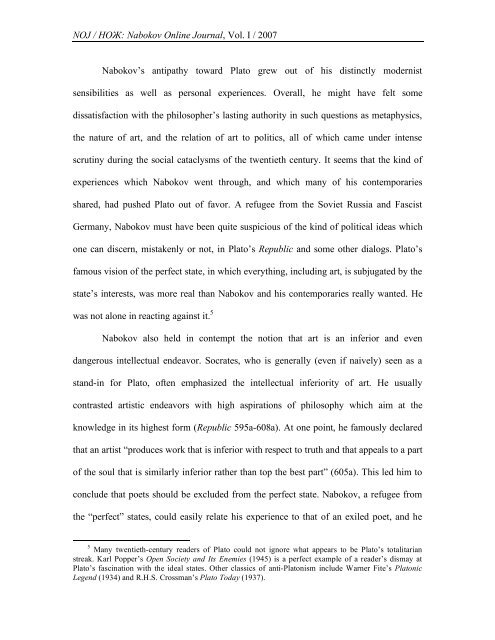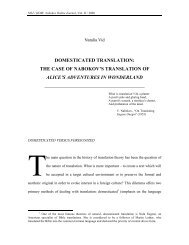Nabokov's Invitation to Plato's Beheading
Nabokov's Invitation to Plato's Beheading
Nabokov's Invitation to Plato's Beheading
- TAGS
- beheading
- etc.dal.ca
You also want an ePaper? Increase the reach of your titles
YUMPU automatically turns print PDFs into web optimized ePapers that Google loves.
NOJ / НОЖ: Nabokov Online Journal, Vol. I / 2007<br />
Nabokov’s antipathy <strong>to</strong>ward Pla<strong>to</strong> grew out of his distinctly modernist<br />
sensibilities as well as personal experiences. Overall, he might have felt some<br />
dissatisfaction with the philosopher’s lasting authority in such questions as metaphysics,<br />
the nature of art, and the relation of art <strong>to</strong> politics, all of which came under intense<br />
scrutiny during the social cataclysms of the twentieth century. It seems that the kind of<br />
experiences which Nabokov went through, and which many of his contemporaries<br />
shared, had pushed Pla<strong>to</strong> out of favor. A refugee from the Soviet Russia and Fascist<br />
Germany, Nabokov must have been quite suspicious of the kind of political ideas which<br />
one can discern, mistakenly or not, in Pla<strong>to</strong>’s Republic and some other dialogs. Pla<strong>to</strong>’s<br />
famous vision of the perfect state, in which everything, including art, is subjugated by the<br />
state’s interests, was more real than Nabokov and his contemporaries really wanted. He<br />
was not alone in reacting against it. 5<br />
Nabokov also held in contempt the notion that art is an inferior and even<br />
dangerous intellectual endeavor. Socrates, who is generally (even if naively) seen as a<br />
stand-in for Pla<strong>to</strong>, often emphasized the intellectual inferiority of art. He usually<br />
contrasted artistic endeavors with high aspirations of philosophy which aim at the<br />
knowledge in its highest form (Republic 595a-608a). At one point, he famously declared<br />
that an artist “produces work that is inferior with respect <strong>to</strong> truth and that appeals <strong>to</strong> a part<br />
of the soul that is similarly inferior rather than <strong>to</strong>p the best part” (605a). This led him <strong>to</strong><br />
conclude that poets should be excluded from the perfect state. Nabokov, a refugee from<br />
the “perfect” states, could easily relate his experience <strong>to</strong> that of an exiled poet, and he<br />
5 Many twentieth-century readers of Pla<strong>to</strong> could not ignore what appears <strong>to</strong> be Pla<strong>to</strong>’s <strong>to</strong>talitarian<br />
streak. Karl Popper’s Open Society and Its Enemies (1945) is a perfect example of a reader’s dismay at<br />
Pla<strong>to</strong>’s fascination with the ideal states. Other classics of anti-Pla<strong>to</strong>nism include Warner Fite’s Pla<strong>to</strong>nic<br />
Legend (1934) and R.H.S. Crossman’s Pla<strong>to</strong> Today (1937).
















